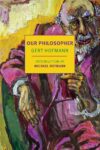Tr. from the Dutch by Vivien Glass
Jorge Louis Borges was once asked what he thought of Pablo Neruda. He said, “I think of him as a good poet, a very good poet; I don’t admire him as a man. I think of him as a mean man.” Borges’ objection to Neruda was most likely political: although he conceded that Neruda deserved the Nobel Prize for his poetry, he considered him a hypocrite for not speaking out against the Perón regime. (Neruda’s second wife was from Argentina).
The Dutch poet Hagar Peeters likewise throws some shade on the celebrated poet in her debut novel, Malva. The book is cheerfully narrated by Neruda’s only daughter, Malva Marina Trinidad de Reyes; she is long dead, a spirit who has been waiting for the Chilean superstar to die too, so that she can finally be reunited with him. Born with hydrocephaly, Malva lived just eight short years. When she was two, her exalted father turned his back on his first wife and severely handicapped child, leaving them to their fate in Nazi-occupied Holland while burnishing his own reputation as poet, diplomat, and champion of the oppressed.
Malva’s parents met in Batavia, the Dutch East Indies, where Neruda was the Chilean honorary consul. Marie Antoinette (Marietje) Hagenaar was a spinster whose Dutch colonial family had fallen on hard times; after a whirlwind romance, the mismatched couple were wed, but the marriage lasted only six years. When the Spanish Civil War broke out, Neruda, who was already involved with another woman, sent Marie and their disabled child from Madrid, where he was stationed at the time, to The Hague. There Marie eventually entrusted Malva’s care to a Christian Science family while trying to scrape together enough money for her support. Malva died in 1942. Despite her pleas to Neruda, who surely could have used his diplomatic clout to rescue her, Marie wound up in a concentration camp. She survived the war destitute, unaware that her husband had already quietly divorced her.
A series of flukes drew Hagar Peeters to Malva’s story. Hagar’s own father wanted nothing to do with her either, at least not at first. An itinerant-hippie journalist/sociologist, he had no relationship with Hagar until she was eleven. Years later, retracing her father’s footsteps in Latin America in order to understand him better, she heard that Neruda too had had a daughter nobody seemed to have heard of. Hagar happened to be in Temuca, Chile (Neruda’s birthplace), when someone told her the poor girl’s grave had just been discovered in the Netherlands. Malva had died in Gouda in 1942 on the day the Nazis began deporting Dutch Jews to the extermination camp Sobibor, and Sobibor was where a good number of Hagar’s father’s relatives met their end. Yet another fortuitous connection: as a reporter, Hagar’s father had witnessed Neruda’s turbulent funeral procession in Santiago, two weeks after the Pinochet coup that brought down President Allende. Chile and the Netherlands, Batavia and Barcelona, the Spanish civil war and Nazi extermination camps: given their overlapping stories, Hagar gives the narrator, Malva, free rein to draw as many metafictional parallels between the two fathers as she likes.
It is clear from the very first page that Hagar Peeters has a bone to pick with deadbeat dads. The novel starts with a powerful poem about her own father, skillfully interpreted by the novel’s talented translator, Vivien Glass.
Godsake that father of mine was always cock
Of the walk when it came to social injustice.
He was a fellow traveler, mover
on the waves of history, describing them
with a steady hand, bullet-free and steadfastly
venturing far into distant misty cities,
further than the shirt and the skirt
my mother hitched up
to give birth to me.
Three other children with father issues are Malva’s playmates in the rather pleasant purgatory-like afterlife where she now resides. There is Lucia, James Joyce’s schizophrenic daughter, and Arthur Miller’s Down syndrome son Daniel. The fictional dwarf Oskar in Günter Grass’ The Tin Drum rounds out this “unwholesome foursome, sitting obediently around a table, drooling a little into our food.” Other candidates hanging around the outskirts of their little clique are Albert Einstein’s schizophrenic son Eduard and the many children abandoned by Paul Gauguin and Jean-Jacques Rousseau.
In her quest to understand her father, Malva seeks out not only fellow “blunders of nature,” but also, mindful of her patrimony, the poets and thinkers she admires, notably Wislawa Szymborska, Goethe, Roald Dahl, Gorky, and Socrates, who conveniently populate the hereafter of her imagination. Each tries to help her make sense of her predicament as the ignored, mutant offspring of a great man. These kindly ghosts are not fleshed out; they are merely there as Malva’s confidants in her quest for relevance. In life Malva may have been mute, but she makes up for it now that she is dead. “I observe all in the dissonance of my absence, in the primal scream of my nonbeing, through the void of my breath and the opiate of my voice.” She has appropriated her father’s pen and wields it like a weapon, putting her own speculative spin on his lovers as well as his relationships with fellow poets Federico García Lorca, Vicente Aleixandre, Gabriela Mistral, and the like.
The writing is lyrical, sensuous, animated by Latin passion and flights of the imagination. Take, for example, the following passage:
If their days were dominated by death in their writing, the nights were dedicated to the dance of the living. There they went, the lord and lady of the dark, the bat-winged villains in their black capes, flitting along the frayed fringes of tango music, brushing with death, brushing against life, fluttering around a lamp post.
This style sets Malva apart, for Dutch literature tends to have a more blunt, laconic sound. In an interview, admitting the influence of South American writers like Gabriel García Márquez, Peeters called her approach “magical realism with a wink; Dutch magical realism, as it were.” The narrative hops back and forth in time, revisiting and embroidering on episodes and themes in a rhapsody of dizzying variations. Malva wants to impress her father, if not the reader, with her poetic language and rhythmic, alliterative sentences, using his discarded words: “I munch and crunch this lunch of language into words of my own.” (In Dutch: “ik vermaal dat allemaal en ik maak er mijn taal van.”) Peeters is lucky to have a translator who understands this saucy style, knows how to convey it in English, and seems to have had as much fun with it as the author herself.
In a curious choice of punctuation, the novel’s sections are separated by semicolons, which, Malva explains, is how her father once described her — “the monster, a perfectly ridiculous being” with an enormous head on a puny body resembling the point-comma of the semicolon — “the ultimate symbol of ambivalence.” To Malva it represents the gateway between the “sad life that went before my death and the beautiful story I made of it afterwards.” And it is true that Malva is not bitter; she continues to hope that her father, in death, will finally notice her. She even worms her way onto his lap as he’s scribbling away — “I pretend he is hugging me, that his writing hand is stroking me, his child on his lap.”
No matter how hard Malva tries to capture his attention, Neruda remains oblivious. In describing her mother, Malva depicts her as from a distance, a sympathetic stranger, lonely and awkward, a woman to be pitied. In contrast, when writing about her father, she is a spy ensconced inside his brain, rounding out what we know of him with her own interpretation of his thoughts and motivations, occasionally erupting in anger, more often hurt, yet forgiving. Ultimately she shows herself to be generous and understanding, even when writing about her father’s third, beloved wife Matilde (“la Patoja”). In her own memoir, Matilde reported that when she had a miscarriage, Neruda blamed her for the loss, just as he had held Malva’s deformity against his first wife Marie.
Much as we may love Neruda’s poetry, it is chastening to find out that the idol has feet of clay. There are too many men in the mold of Pound, Eliot, Elvis, Salinger, and Michael Jackson — call them the immoral immortals — whose conduct, once exposed, makes us think twice about our admiration of their work. Does their genius absolve them of their bad behavior, or should the two things be kept carefully apart?
It was inevitable that in the #MeToo era, the legacy of Pablo Neruda, like that of so many “great men,” would come to be reassessed. In his memoir (Confieso que he vevido, posthumously published) he breathed not one word about Malva’s existence, a fact that rankles painfully in this novel. In the same memoir, however, he did find it worth mentioning that as a young diplomat in Rangoon, he once forced a hotel maid to have sex with him. At the time he wrote that, it may still have seemed honest and brave, a confession of guilt or self-disgust. But now the proposed renaming of Chile’s main international airport in honor of Neruda is being met with loud protests from women’s groups, claiming that in light of his self-confessed crime, he does not deserve the recognition. And so, almost a century later, Neruda’s reputation is in danger. The current controversy was initially set off by the disclosure that he was a rapist. But since the publication of this novel in English, his cruel abandonment of his daughter is being cited as yet another, even more unforgivable sin, one that could well end up toppling him off his pedestal.
Which is worse, the rape or the rejection of wife and child? And how are these sins offset by Neruda’s heroism in saving the lives of over twenty thousand Spanish fighters at the end of the Spanish Civil War, or the gift of his stirring poetry to the hopeless and the oppressed? These are questions best left to his biographers. The heroine of Malva is a fictional creation, and as a typical daughter, she is only too prepared to justify her father’s behavior — just as, in this novel, Arthur Miller’s disowned son Daniel gives his father a pass because of his refusal to name names during the McCarthy era and his principled stand against the Vietnam War.
Malva, for her part, finds plenty of excuses for her father. Coming to terms with her own part in the tragedy as “a leech, a freak, the monster” she sees his abandonment of her as a choice he had to make. As Neruda explains to Socrates in a somewhat acrimonious posthumous debate, “I was able to help more people with my poetry than I would have been if I had dedicated myself exclusively to my daughter’s care.” Malva reflects, “I was the stagnation, the stumbling block, the setback that would have kept him from everything else in his life.” Being a good father would have meant losing his literary might and masculine potency: “It was either me, or an entire continent at his feet.”
Hester Velmans is a translator of Dutch and French literary fiction. Awards include the Vondel Prize for Translation and an NEA Fellowship. She has also written two popular children’s novels and recently published her first novel for adults, Slipper. She hopes you’ll visit her website, Hestervelmans.com.
This post may contain affiliate links.








